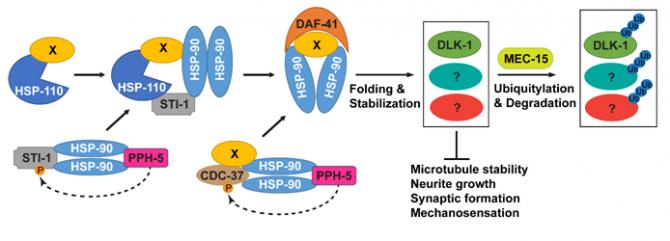An unexpected heat shock to neurons: HKU scientists and collaborators uncover a new mechanism for balancing protein stability during neuronal development

Credit: @The University of Hong Kong
A research team led by Dr Chaogu Zheng from the School of Biological Sciences at the University of Hong Kong (HKU), in collaboration with a team led by Professor Martin Chalfie (2008 Nobel Laureate in Chemistry) from the Department of Biological Sciences at Columbia University, recently discovered an unexpected role of the heat shock proteins (HSPs), also known as the molecular chaperones, during neuronal differentiation, which refers to the process a neuron takes to acquire its shape and function. HSPs are mostly known to protect cells from various stresses, e.g. extreme temperatures, toxins, and mechanical damage, and to safeguard tissue development. This new study, however, suggests that the Hsps can also play an inhibitory role in neuronal differentiation by destabilizing the cytoskeleton of the neurons. The research findings were recently published in a leading international journal in the developmental biology – Development.
Protein quality control is important for normal development in human cells, and its dysregulation leads to a range of neurodevelopmental disorders. Inside cells, the Hsps and other chaperones promote protein folding and stability, while the ubiquitination-proteasome system (UPS) targets proteins for degradation. The HSPs and UPS pathways often collaborate to eliminate irreparable proteins in some cellular contexts, but their interaction in developing neurons is not well understood. Using neurons from a model organism called Caenorhabditis elegans, which can be easily genetically manipulated, the research team discovered that when the UPS system is compromised in genetic mutants, a major part of the cytoskeleton called microtubules is destabilized, leading to defects in the axonal growth (axons are the projections of neurons). Surprisingly, through a genetic screen, the team found that deleting the HSPs and co-chaperones can fully rescue the defects caused by the compromised UPS, suggesting that the two systems counter each other during development.
Furthermore, a protein kinase called DLK-1 was found to be stabilized by the HSPs and degraded by the UPS. The overabundance of DLK-1 caused instable microtubules and neuronal growth defects. Thus, by regulating the same target proteins, HSPs and UPS can fine-tune the level of critical signaling molecules and create a tightly controlled balance between protein stability and degradation. The discovery of this mechanisms can help understand the molecular basis of neurodevelopmental diseases, nerve regeneration, and neurodegenerative diseases.
“This research identifies a previously underappreciated role of HSPs in neuronal development and suggests that HSPs may not be always protective of cellular morphology and functions,” said Dr Zheng. At the same time, this research also opens up a new direction to understand the antagonism between the HSPs and the UPS system in maintaining a balance between protein stabilization and turnover. In the further, Dr Zheng suggests the research will be focused on identifying the common targets of the two HSPs and UPS pathways, which will be the critical control point of not only neuronal development but also neuronal regeneration. Dr Zheng envisions that a complete understanding of the relationship between chaperoning and degradation of proteins can help identify the key therapeutic targets of many neurological diseases.
###
About the research paper
The paper is published in Development can be accessed here:
“Opposing effects of an F-box protein and the HSP90 chaperone network on microtubule stability and neurite growth in Caenorhabditis elegans”
Link: https:/
This work is supported by funding from The University of Hong Kong, Research Grant Council of Hong Kong, and The Institute of Health of United States.
Image download:
https:/
Media Contact
Cindy Chan
[email protected]
Original Source
https:/
Related Journal Article
http://dx.




